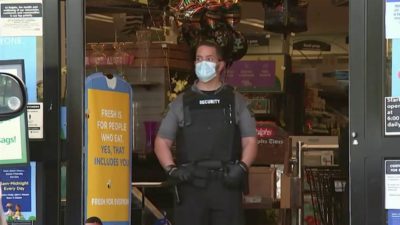May is Mental Health Month and the Internet is a verbal battleground over COVID-19 issues, including the wearing of facemasks.
The conflicts were almost inevitable as the coronavirus known as CVOID-19 has impacted most everyone; people sequestered at home for more than two months, businesses and schools shuttered, travel mostly stopped, and feelings of dread and uncertainty as [the coronavirus known as] COVID-19 spread across the country and globe, to infect millions, perhaps killing hundreds of thousands.
In a pandemic not seen in a hundred years here, the social fabric of the U.S. and other countries has been stressed as seldom before.
As health experts and governments established rules to prevent the spread of the deadly virus, possibly even by those who displayed no symptoms but who still carried the disease, the political divisions already deeply affecting the U.S. were also applied to this pandemic’s matrix.
 Locally, incidents of conflict over having to wear face coverings and distance socially began to manifest, from comments on social media to officials and between citizens online, even including instances of threats and violence.
Locally, incidents of conflict over having to wear face coverings and distance socially began to manifest, from comments on social media to officials and between citizens online, even including instances of threats and violence.
On social media, it seems political divisions have deepened and exacerbated resentment toward those who have found new oppositional positions to criticize and to be defensive about. The sight of so-called ‘patriots,’ heavily armed as they protest state shutdowns are as aggravating to compliant citizens as their mask-wearing and social distancing is to the minority protesters.
Local law enforcement, including the Salida Police Department which has been called in to address customers refusing to wear masks in Salida stores, recognizes the emotional strain on people. That strain affects people unable to work, trying to school children at home, unable to gather for social interactions, and stunned by the sudden change in everyday living all can lead to conflicts. They also warn of the inability to handle every conflict in terms of manpower, as strong feelings sometimes lead to strong actions.
So what’s to be done?
Some guidance can be found with the experts who deal with such issues on a regular basis. As our health officials and leaders debate complex issues of guarding health and lessening the blow of sharp economic impacts, criticism often rains down despite their best efforts.

Recently, Kelsey McNeill of Solvista Health, Child, Family, and Adult Program Supervisor for Chaffee and Lake Counties, spoke at a Chaffee County session about her own dismay at having to stop scrolling across Facebook after reading all the often stormy rhetoric about how the pandemic is being handled in this country.
She said these differences of opinion, “lead to an escalation that leaves us feeling disconnected and disrespected.” McNeill said she had to ‘step back’ a bit to find her footing.
“I find it in remembering that everyone is doing their best. Sometimes our best doesn’t look all that great, especially in the midst of a crisis,” she said.
McNeill reminded participants of a quote she’d heard: We’re not in the same boat, but we’re in the same storm.”
“How this storm impacts each of us is different – the boat I’m in may look different from yours,” she added. “And when I remember each of us is trying to navigate the best way we know how, it helps. When taking this point of view, it’s easier to have understanding, compassion, and respect,” she added.
In follow-up questions, McNeill said it’s alright to disconnect when things seem out of control.
“There are things we can control, and things we can’t. When others are making comments in online and social media forums that we find cause us to feel stress, anxiety, or anger, we can disconnect. We cannot change another’s mind, and sometimes when we try, we end up consumed by the effort and feeling helpless,” she said.
“Recognize when it is time to unplug. Focus on the things that are within your control – sometimes even cleaning or yard work can give us back a sense of being centered. In times of crisis, we don’t have a lot of energy to give. Choose to use your energy in ways that will help you feel better. If you find that you struggle to manage the strong feelings in these situations, it may be a good time to ask for help,” McNeill added.
“I think it is safe to say that most of us have experienced some level of hardship in this pandemic. The kind of hardship, and the depth of the pain, varies. Folks have lost loved ones and are grieving. Others have lost income and don’t know where their next meal is coming from. We have all lost forms of connection; from working or doing school at home, to missing out on favorite activities, to being limited in visits to family members. Many are frightened about their own health, or the health of loved ones,” she said.
“We are all experiencing the storm. And we are all doing our best to weather the storm. This is what is vital to remember. We are all doing our best. It might not look all that great, we might not understand how someone on a different boat is coping, but that they too are trying. No one aims to do poorly.”
Asked about what kinds of at-home activities might be used to mitigate the stress of dealing with life under COVID-19, McNeill said that going back to basics is part of the answer.
“Start with taking care of your basic needs — eat well, do your best to sleep, drink water, and move your body. Avoid excess alcohol and substances. Create a routine for yourself, waking, eating, and exercising at specific times. Minimize media/social media, as it can be overwhelming,’ she advised.
“As our weather warms, get outdoors. Walk, garden, notice the singing birds, and the budding leaves. Find a way to connect with others. Video calls are almost as good as having a loved one with us, McNeill added.
“Make time to laugh. This has been such a serious time on so many levels – watch funny YouTube videos or standup comedy, or call a friend who has a good sense of humor.
“One of the most important things to know is that it is normal to experience a range of emotions during this time. We say that intense emotions (anxiety, fear, sadness, frustration, anger) are normal reactions to an abnormal situation. If you have a bad day, be kind to yourself, and know you did the best you could. If your strong emotions are getting the best of you, day after day, reach out for support,” McNeill advised.
Solvista is one resource for that support, she said.
“Solvista Health is available to support behavioral health needs across our community. We provide individual, family, and group therapy for all ages. Solvista accepts most insurances. During this time, we offer free virtual support groups via Zoom with a variety of topics ranging from coping with grief, addiction recovery, parenting during COVID-19, cooking, music, and homework help for students. We are available for crisis support 24/7. For questions or to begin any of these services, simply call 719-539-6502,” she said.
Featured image: Buffalo Photo by Richard Lee on Unsplash.








Recent Comments